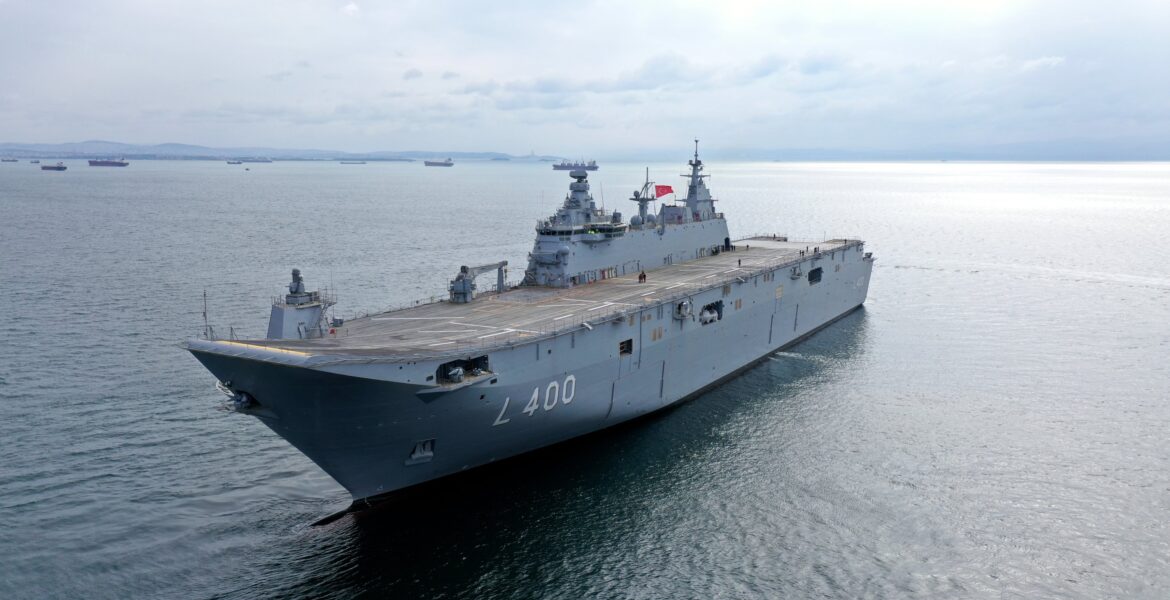The launch of two new Turkish frigates this month is the latest example of a naval expansion effort that will grant Ankara increased influence in the Mediterranean, Aegean, and Black Seas—and beyond.
It also signifies the diversification of Turkey's growing domestic defense industry, which is primarily known for its unmanned aerial drones.
As reported by Bloomberg:
This is a long-term investment that could benefit from escalating conflicts over maritime trade routes, as Houthi rebels threaten commercial ships off Yemen, Ukraine and Russia exchange attacks in the Black Sea, and NATO intensifies surveillance to prevent sabotage of undersea cables.
Additionally, 29 ships are under construction in Turkish shipyards, including the country’s first domestically produced submarines, cruisers, and aircraft carriers. According to Bloomberg estimates, the Turkish fleet will grow to 209 ships, based on the latest inventory from the International Institute for Strategic Studies.
“This not only shifts the regional balance of power but also marks Turkey’s emergence as a naval force capable of projecting power abroad while maintaining sovereignty in strategically vital, geographically complex areas like the Aegean,” said Suha Cubukcuoglu, a senior researcher at Trends Research & Advisory.
The aggressive strategy is rooted in the "Blue Homeland" doctrine, which seeks to assert control over larger portions of the maritime zones surrounding the country. This has led to numerous disputes with Greece and Cyprus in the Aegean and Eastern Mediterranean over maritime boundaries and undersea energy resources.
Although tensions have eased since a naval standoff in 2020 that nearly brought the two countries to conflict, neither side has backed down from its claims over exclusive economic zones.
Meanwhile, Turkey is seeking international recognition to bolster its position, signing a maritime border delimitation agreement with Libya in 2019 and planning a similar deal with Syria.
Further afield, the Turkish navy escorts hydrocarbon exploration vessels in Somalia, home to Ankara’s largest overseas military base.
All this military might comes at a cost, with Turkey, one of the Mediterranean's top defense spenders, budgeting $45 billion for defense in 2025—an 11% increase from the previous year.
Turkish President Recep Tayyip Erdoğan has used defense development to promote domestic production, reducing dependence on Western suppliers who have occasionally imposed arms embargoes on Turkey over political disagreements.
The domestic defense industry is now the navy’s greatest asset, according to Cubukcuoglu, who stated, “Twenty years ago, it relied heavily on equipment sourced from the U.S. and NATO. Today, approximately 75%-80% of components are domestically produced.”
Turkish shipbuilding companies have constructed ships for fleets in Qatar, Pakistan, Ukraine, and Iraq, while securing new orders from Saudi Arabia, Malaysia, and Portugal. They also finalized their first export deal for an unmanned surface vehicle (USV) or sea drone in 2024, selling to Qatar.
Turkey boasts one of NATO’s leading USV programs, positioning it strongly to capitalize on the development of a market that intelligence company Janes estimates will be worth $7.8 billion by 2032.
Source: Bloomberg [Turkey Bets on New Naval Clout for Edge in High-Seas Power Play]
Stay updated with the latest news from Greece and around the world on greekcitytimes.com.
Contact our newsroom to share your updates, stories, photos, or videos. Follow GCT on Google News and Apple News.


